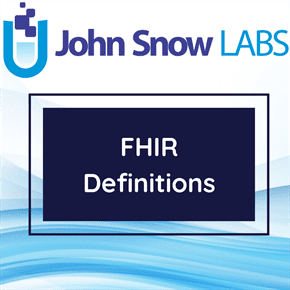John Snow Labs Standard End User License Agreement
Last updated:January 20, 2021
This Standard End User License Agreement (“EULA”) applies to customers of John Snow Labs Inc. (as defined below), using any product of John Snow Labs Inc. on John Snow Labs Marketplace as defined below (hereinafter referred to “you”) and John Snow Labs Inc., a Delaware corporation (“John Snow Labs”, “we” or “us”).
By downloading, installing, and/or using (as applicable) any Product of John Snow Labs (as defined below), you automatically agree to be bound by, and use our Products in compliance with, this EULA. This EULA, together with additional terms and conditions and/or policies referenced herein or located on https://www.johnsnowlabs.com and/or conveyed to you by John Snow Labs, is a legally binding contract between you and John Snow Labs.
PLEASE READ THIS EULA CAREFULLY BEFORE PURCHASING, INSTALLING OR USING OUR PRODUCTS MADE AVAILABLE ON JOHN SNOW LABS MARKETPLACE.
We may make changes to this EULA from time to time. When we do so, we will revise the “last updated” date given above. The then-current version of this EULA will supersede all earlier versions. You agree that your continued use of our Products after such changes have been published to our EULA will constitute your acceptance of such revised EULA.
Definitions
“John Snow Labs Data Library” means a data library located at https://www.johnsnowlabs.com;
“Products” means products and services of John Snow Labs that you download and use from listings in John Snow Labs Data Library;
Important Notice
By installing and using our Products, you acknowledge that the use of the Products can be subject to the restrictions and controls imposed by United States export regulations.
You represent and warrant that you do not intend to use the Products for any purpose prohibited by United States export regulations, including, without limitation, terrorism, cyber-attacks, cyber-crimes, money-laundering, industrial espionage, or nuclear, chemical or biological weapons proliferation. Further, you represent and warrant that you are not listed as a denied party on any list governing United States exports.
Eligibility
Our Products can be used by an individual, business or other legal entity, or both. If you are entering into this EULA, or using the Products, on behalf of a company or other legal entity, you represent that you have the authority to bind such entity to this EULA, in which case “you” shall refer to such entity.
In the event you have entered into a separate written agreement with John Snow Labs regarding the Products that contemplates terms that are inconsistent with this EULA, the written agreement shall control and this EULA will not apply to you to the extent inconsistent with such written agreement, or, if such written agreement is contemplated to be in lieu of this EULA, then this EULA shall not apply at all.
Your Access and Use
Subject to your compliance with this EULA, as well as any other applicable policies, John Snow Labs grants you non-exclusive, non-transferable, license to install, access to, modify, and use of, the Products worldwide (subject to applicable export laws) during the term of this EULA (as described below) solely for research, private study and personal use of Products.
This license is personal to you, and you may not resell our Products, permit other users access to our Products through your account. Your right to use our Products is limited by all terms and conditions set forth in this EULA.
Except for your pre-existing rights and this license granted to you, we and our licensors retain all rights, titles and interests in and to our Products, all related intellectual property rights, including trademarks (whether registered or pending), domain and business names. Our Products are protected by applicable intellectual property laws, including United States copyright law and international treaties.
Except for the foregoing license, you have no other rights in the Products and you may not modify, edit, copy, reproduce, create derivative works of, reverse engineer, alter, enhance or in any way exploit the Products in any manner. If you breach any of this EULA, the above license will terminate automatically.
You will be deemed to have taken any action that you permit, assist or facilitate any person or entity to take related to this EULA, your content or use of the Products. You are responsible for end users’ use of your content and the Products. You will ensure that all end users comply with your obligations under this EULA and that the terms of your agreement with each end user are consistent with this EULA. If you become aware of any violation of your obligations under this EULA caused by an end user, you will immediately suspend access to your content and the Products by such end user. We do not provide any support or services to end users unless we have a separate agreement with you or an end user obligating us to provide such support or services.
Restrictions
You will access or use our Products solely via John Snow Labs Data Library.
Except as otherwise explicitly provided in this EULA or as may be expressly permitted by applicable law, you will not, and will not permit or authorize any third party to:
- reproduce, modify, translate, enhance, decompile, disassemble, reverse engineer or create derivative works of any of our Products or its technological features or measures;
- rent, lease, sell, resell, loan, distribute, or sublicense access to any of our Products;
- circumvent or disable any security or technological features or measures of our Products;
- use our intellectual property rights without our express prior written authorization;
- use our Products for more than one trial period, unless the trial period is extended by John Snow Labs’ prior written permit;
- use our Products with an intent to build a competitive product or service, or copy or substantially copy any ideas, features, functions, organization, structure, application program interface, graphics, or user interface of the Products;
- store, copy, modify, distribute, or resell any of the information; audio, visual, and audiovisual works, or other content made available on our Products (collectively, “Content”) or compile or collect any Content as part of a database or other work;
- use any automated tool (e.g., robots, spiders) to access or use our Products, or to store, copy, modify, distribute, or resell any Content;
- circumvent or disable any rights management, usage rules, or other security features of our Products;
- use our Products in a manner that overburdens, or that threatens the integrity, performance, or availability of, our Products; or
- remove, alter, or obscure any proprietary notices (including copyright and trademark notices) on any portion of our Products or any Content.
Fees and Taxes
Your use of the Products is subject to our fees. All fees are given on our website https://www.johnsnowlabs.com. Except as set forth in this EULA, the fees are non-refundable. We are entitled to revise our fees from time to time.
The fees exclude any federal, state or local taxes, VAT, GST, or similar taxes. You are responsible for identification and payment of all taxes as required by applicable law.
Term and Termination
This EULA will become effective as of the date of your order of Products and shall be in effect until terminated.
John Snow Labs may suspend or terminate your right to use our Products, if you or your end user’s use of the Products:
- is in breach of this EULA;
- poses a security risk to our Products;
- could adversely impact our systems, the Products or other customers;
- could subject us, our affiliates, or any third party to liability; or
- could be fraudulent.
We may also suspend or terminate your right to use our Products, if you fail to perform your payment obligations, or you have ceased to operate in the ordinary course, made an assignment for the benefit of creditors or similar disposition of your assets, or become the subject of any bankruptcy, reorganization, liquidation, dissolution or similar proceeding.
We may also suspend or terminate your right to use our Products without any reason upon a relevant 30 days’ written notice to you and will refund the unused fees pre-paid by you for access to the Products for the affected time period (if any). Where your access is suspended or terminated by the breach of this EULA or applicable laws, John Snow Labs will will not provide, or be liable for, any refund.
You will cease use of the Products during any period of suspension, or upon termination of this EULA.
All provisions which by their nature are intended to survive termination shall survive termination of this EULA.
Support
If applicable to your Product, John Snow Labs will provide you with the support services. If you use a trial access, support services are excluded. Under this EULA, our support services exclude any installation, training, maintenance services (including any error corrections, bug fixes, or new releases), technical assistance, consulting services, or other services of any kind. Such services are provided at John Snow Labs’ discretion.
From time to time John Snow Labs can perform updates to our software. If available, such updates may include bug fixes, new features and/or enhancements. You are solely responsible for deploying such updates at your own risk and liability.
Access to our Products
We do not provide you with the equipment to access our Products. You are responsible for all fees charged by third parties related to your access and use of our Products (e.g., charges by Internet service providers).
You are responsible for monitoring your use of the Products, including payment of all fees and/or taxes related to such access and use. You agree that John Snow Labs is permitted to request and you hereby consent to provide John Snow Labs information related to your use of the Products for auditing purposes.
You also certify that you are legally permitted to use the Products, and take full responsibility for the selection and use of the Products. This EULA is void where prohibited by law, and the right to use the Products is revoked in such jurisdictions. John Snow Labs makes no claim that the Products may be lawfully used outside of the United States. If you use the Products from outside of the United States, you do so at your own risk and you are responsible for compliance with the laws of jurisdiction.
Privacy Policy
We may collect, store and receive personal and other information about you through our Products. Our collection and use of this information is governed by our Privacy Policy available at https://www.JohnSnowLabs.com/privacy/ which may be amended from time to time.
Links and Third Party Content
Our Products may display, or contain links to, third party products, services, and websites. Any opinions, advice, statements, services, offers, or other information that constitutes part of the content expressed, authored, or made available by other users or other third parties, or which is accessible through or may be located using our Products (collectively, “Third Party Content”) are those of the respective authors or producers and not of us or our shareholders, directors, officers, employees, agents, or representatives.
We do not control Third Party Content and do not guarantee the accuracy, integrity or quality of such Third Party Content. We are not responsible for the performance of, we do not endorse, and we are not responsible or liable for, any Third Party Content or any information or materials advertised in any Third Party Content. By using our Products, you may be exposed to content that is offensive, indecent, or objectionable. We are not responsible or liable, directly or indirectly, for any damage or loss caused to you by your use of or reliance on any goods, services, or information available on or through any third party service or Third Party Content. It is your responsibility to evaluate the information, opinion, advice, or other content available on and through our Products.
Proprietary Rights
John Snow Labs will not obtain any rights under this EULA from you (or your licensors) to your content.
The Products, including software, is and remains the exclusive property of John Snow Labs and its licensors. Except for the access and use rights expressly set forth in this EULA, no license or other rights in or to the Products or John Snow Labs trademark(s) and other intellectual property rights therein, are granted to you, and all such licenses and rights are expressly reserved. You will not remove, alter, or obscure any proprietary notices (including copyright and trademark notices) on any portion of our Products or any Content.
Trademarks
“John Snow Labs,” the John Snow Labs logo, and any other product, business or service name or slogan, whether registered or pending, displayed on our Products are trademarks of John Snow Labs, Inc. or its suppliers or licensors, and may not be copied, imitated or used, in whole or in part, without the prior written permission of John Snow Labs or the applicable trademark holder. You may not use any metatags or any other “hidden text” utilizing “John Snow Labs” or any other name, trademark or product, business or service name of John Snow Labs without our prior written permission. In addition, the look and feel of our Products, including all page headers, custom graphics, button icons and scripts, is the service mark, trademark and/or trade dress of John Snow Labs and may not be copied, imitated or used, in whole or in part, without our prior written permission. All other trademarks, pending trademarks, registered trademarks, product names and company names or logos mentioned in our Products are the property of John Snow Labs Inc. and/or their respective owners. Reference to any products, services, processes or other information, by trade name, trademark, manufacturer, supplier, or otherwise does not constitute or imply endorsement, sponsorship, or recommendation thereof by us.
Disclaimer of Warranties
YOUR USE OF THE PRODUCTS IS AT YOUR SOLE RISK. THE PRODUCTS AND CONTENT EACH ARE PROVIDED ON AN “AS IS” AND “AS AVAILABLE” BASIS. WE AND OUR SUPPLIERS AND LICENSORS EXPRESSLY DISCLAIM ALL WARRANTIES OF ANY KIND, WHETHER EXPRESS OR IMPLIED, INCLUDING, BUT NOT LIMITED TO THE IMPLIED WARRANTIES OF MERCHANTABILITY, FITNESS FOR A PARTICULAR PURPOSE, TITLE, AND NON-INFRINGEMENT. WE DO NOT GUARANTEE THE ACCURACY, COMPLETENESS, OR USEFULNESS OF THE PRODUCTS OR ANY CONTENT, AND YOU RELY ON THE PRODUCTS AND CONTENT AT YOUR OWN RISK. ANY MATERIAL THAT YOU ACCESS OR OBTAIN THROUGH OUR PRODUCTS IS DONE AT YOUR OWN DISCRETION AND RISK AND YOU WILL BE SOLELY RESPONSIBLE FOR ANY DAMAGE TO YOUR COMPUTER OR LOSS OF DATA THAT RESULTS FROM THE DOWNLOAD OF ANY MATERIAL THROUGH OUR PRODUCTS. NO ADVICE OR INFORMATION, WHETHER ORAL OR WRITTEN, OBTAINED BY YOU FROM US OR THROUGH OR FROM OUR PRODUCTS WILL CREATE ANY WARRANTY NOT EXPRESSLY STATED IN THIS EULA. SOME STATES MAY PROHIBIT A DISCLAIMER OF WARRANTIES AND YOU MAY HAVE OTHER RIGHTS THAT VARY FROM STATE TO STATE.
Limitation of Liability
WE AND OUR SUPPLIERS AND LICENSORS WILL NOT BE LIABLE FOR ANY DIRECT, INDIRECT, INCIDENTAL, SPECIAL, CONSEQUENTIAL, OR EXEMPLARY DAMAGES, INCLUDING BUT NOT LIMITED TO, DAMAGES FOR LOSS OF PROFITS, GOODWILL, USE, DATA, OR OTHER INTANGIBLE LOSSES (EVEN IF WE HAVE BEEN ADVISED OF THE POSSIBILITY OF THESE DAMAGES), RESULTING FROM YOUR USE OF OUR PRODUCTS AND CONTENT. UNDER NO CIRCUMSTANCES WILL THE TOTAL LIABILITY OF US AND OUR SUPPLIERS AND LICENSORS OF ALL KINDS ARISING OUT OF OR RELATED TO YOUR USE OF THE PRODUCTS AND CONTENT (INCLUDING BUT NOT LIMITED TO WARRANTY CLAIMS), REGARDLESS OF THE FORUM AND REGARDLESS OF WHETHER ANY ACTION OR CLAIM IS BASED ON CONTRACT, TORT, OR OTHERWISE, EXCEED THE AMOUNTS, IF ANY, THAT YOU HAVE PAID FOR YOUR USE OF THE PRODUCTS AND CONTENT. BECAUSE SOME STATES DO NOT ALLOW THE EXCLUSION OR LIMITATION OF LIABILITY FOR CONSEQUENTIAL OR INCIDENTAL DAMAGES, THE ABOVE LIMITATION MAY NOT APPLY TO YOU.
Indemnity
To the full extent permitted by applicable law, you shall defend, indemnify and hold harmless John Snow Labs, its affiliates and its licensors, and each of their respective employees, officers, directors, and representatives from and against any claims, damages, losses, liabilities, costs, and expenses (including reasonable attorney’s fees) arising out of or relating to any third party claim concerning: (a) your use of the Products; (b) breach of this EULA or violation of applicable law by you; (c) any content or the combination of such content with other software, content or processes, including any claim involving alleged infringement or misappropriation of third-party rights by such content or combination; or (d) breach of any obligation or duty you owe to a third party.
Legal Notices
Enforcement of this EULA will be governed by the laws of the State of Delaware, excluding its conflict and choice of law principles. The exclusive jurisdiction and venue for any claims arising out of or related to this EULA or your use of the Products will lie in the state and federal courts located in Sussex County, within the State of Delaware, and you irrevocably agree to submit to the jurisdiction of such courts. Our failure to enforce any right or provision in this EULA will not constitute a waiver of such right or provision unless acknowledged and agreed by us in writing. In the event that a court of competent jurisdiction finds any provision of this EULA to be illegal, invalid, or unenforceable, the remaining provisions will remain in full force and effect.
Notifications
We may use your contact information to notify you if we have any legitimate interest or if we need to notify you on any important information related to your use of Products. We will not send you newsletters unless you expressly consented to such notifications.
Contacting Us
If you have any questions or concerns about our Products or this EULA, you may contact us by email at support@JohnSnowLabs.com.
























